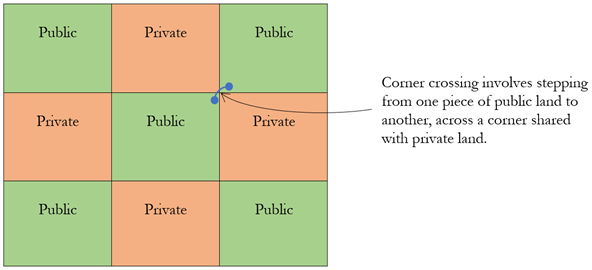Groups File Amicus Brief to Defend Right to Access Public Land Via Corner Crossing
Tenth Circuit case could confirm public’s right to access millions of acres of public land
Contact
Conservation and environmental justice groups filed an amicus brief with the U.S. Court of Appeals for the Tenth Circuit today to defend the right to access public land via corner crossing. A favorable decision in the case would help safeguard the public’s right to access over 8 million acres of public land across the West, benefiting hikers, hunters, fishermen, and wildlife watchers alike.
“Public lands are held in trust for all Americans, including future generations, to benefit from. When private landowners attempt to obstruct public land access through tactics ranging from physical blockades to verbal or written threats, vulnerable potential public land users are deterred from enjoying public lands for a myriad of cultural, recreational, and scientific uses allowed by the law. We are counting on the Tenth Circuit to defend our public trust,” said Olivia Juarez, public land program director for GreenLatinos.
Earthjustice filed the brief on behalf of Great Old Broads for Wilderness, GreenLatinos, Sierra Club, and Western Watersheds Project in the Tenth Circuit case Iron Bar Holdings, LLC v. Cape, No. 23-8043. The groups argue that the four hunters who corner crossed had a legal right to step momentarily through shared airspace to access public land, and that Iron Bar’s trespass action is an unjust and unlawful attempt to take exclusive control of public land. In the brief, the groups note that their members have encountered confusing access situations; threatening, intimidating, and even violent landowners; and other barriers to access that prevent them from engaging in recreational activities on public lands.
“Millions of acres of western public land are locked behind private ranchlands without any access for the public, and Wyoming’s checkerboard lands are a prime example,” said Erik Molvar, executive director with Western Watersheds Project. “The public — not just hunters but everyone — should have the same right of reasonable access to their lands as private landowners have.”
Corner crossing refers to stepping from one piece of public land to another over a corner shared with private land. A significant amount of federal land in the West is arranged in a checkerboard pattern, with alternating sections of public and private parcels. As a result, roughly 8.3 million acres of public land is “corner-locked,” meaning no public road or trail provides direct access, and it touches other public land only at the corners.
“If the Iron Bar appeal is successful, millions of acres of ‘checkerboard’ public lands across the West could be—for all intents and purposes—rendered permanently inaccessible except to a few wealthy adjacent landowners,” said Sara Husby, executive director of Great Old Broads for Wilderness. “This would amount to the de facto privatization of public land that is rightfully held in trust for the benefit of all Americans, and is absolutely unacceptable.”
In 2020, and again in 2021, four hunters challenged the status quo by accessing public land in Wyoming via corner crossing. Interspersed with these public lands is Elk Mountain Ranch, which is owned by Iron Bar Holdings – the North Carolina-based company of pharmaceutical mogul Fred Eshelman. After a jury acquitted the hunters of criminal trespass, Iron Bar sued them for civil trespass.
In May 2023, a federal district court in Wyoming rejected Iron Bar’s claims, finding that “where a person corner crosses on foot within the checkerboard from public land to public land without touching the surface of private land and without damaging private property, there is no liability for trespass.”
Iron Bar then appealed the decision to the Tenth Circuit.
“Access to nature is a human right, and these lands in particular are public lands, meant for the public to enjoy,” said Sierra Club Outdoors for All Campaign Director Jackie Ostfeld. “Communities already face barriers to outdoors access that include cost, transportation, and accessibility. We need to do whatever we can to foster more opportunities for people to engage with the outdoors, instead of creating more barriers inhibiting them from doing so.”
“This case is yet another example of private landowners attempting to control access to our shared public lands,” said Tom Delehanty, senior associate attorney with Earthjustice’s Rocky Mountain Office. “Iron Bar’s lawsuit is designed to prevent hunters, fishermen, and everyone else from accessing this land so that the company’s multi-millionaire owner can have it for himself. That’s both unlawful and unjust, and we’re hopeful the Tenth Circuit will see it that way as well.”
“Access to public land should not be limited to those wealthy enough to purchase adjacent property,” said Rob Joyce, acting director of the Sierra Club Wyoming Chapter. “Maintaining the ability to cross from one public parcel to another not only makes sense, but it will preserve the public’s right to enjoy the wild Wyoming landscapes owned by all.”
In the amicus brief, the groups urged the court to protect our public land from privatization and public resources for future generations. The groups noted that the district court’s ruling was an essential conclusion to clear one of the many real barriers that the public faces when recreating on public land — barriers that disproportionately harm women, communities of color, low-income communities, and migrant community members.

Additional Resources
About Earthjustice
Earthjustice is the premier nonprofit environmental law organization. We wield the power of law and the strength of partnership to protect people's health, to preserve magnificent places and wildlife, to advance clean energy, and to combat climate change. We are here because the earth needs a good lawyer.